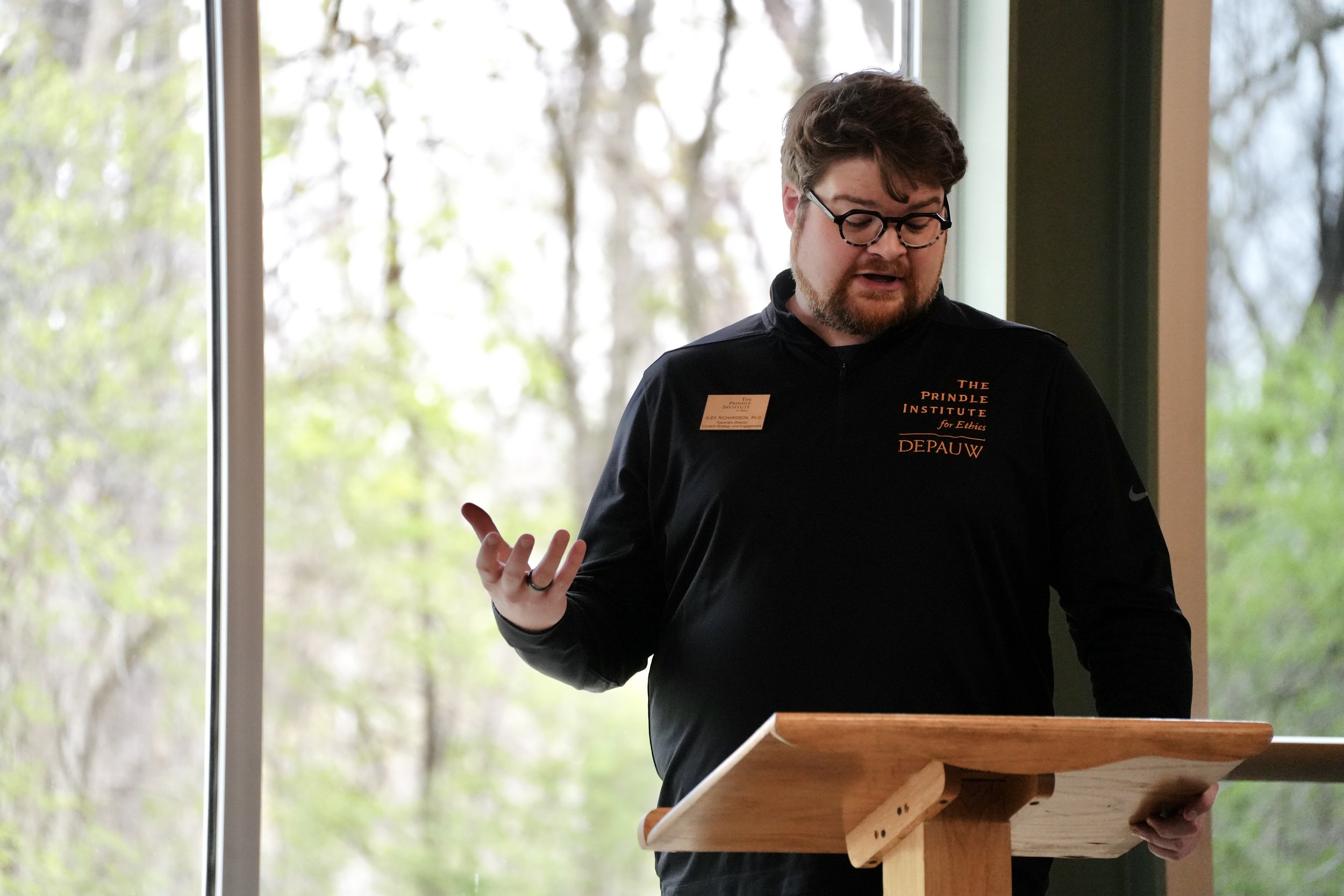Public Philosophy
I believe that philosophy finds its fullest expression in our public lives, and ought to be practiced as such. Done well, I think philosophy can engage all in meaningful inquiry about their values and beliefs, and about their personal, social, and political lives more generally. Given this picture, I am committed to developing meaningful and productive relationships between the academy and the surrounding community and society. I believe this involves taking seriously community members’ natural curiosity and ability to think carefully about fundamental ideas, and I strive to make opportunities to think philosophically as widely available as possible.
The Prindle Institute for Ethics
I am Associate Director for Content Strategy and Engagement at the Janet Prindle Institute for Ethics at DePauw University, where I also teach in the Department of Philosophy. At the Institute, I oversee all digital platforms, products, and services which advance our educational mission. These include our Educator Resource Hub, The Prindle Post newsmagazine, the renowned Teaching Children Philosophy resource collection, and the popular Examining Ethics podcast. I also lead the Institute’s national partnerships and public engagement initiatives. To learn more about the Prindle Institute and its various programs, please visit prindleinstitute.org.
Current and
Recent Projects
-
I host and produce the Prindle Institute’s popular podcast, Examining Ethics. The show is designed to bring insights from the cutting edge of moral philosophy and ethics education to a broad and general audience. Typical episodes feature a ~30 minute interview with the author of a new book or article exploring an interesting ethical question or dilemma. Slightly longer “feature” episodes for the 2024-2025 season engage with key themes and issues in ethics education and pedagogy. Representative recent episodes have included a discussion with Robert Talisse (Vanderbilt) on his new book, Civic Solitude, a conversation with Michael Vazquez (UNC) and Michael Prinzing (Wake Forest) about whether and how studying philosophy helps students develop intellectual virtues, and a conversation with Krista Thomason (Swarthmore) about the ethics of negative emotions like spite and contempt. Examining Ethics is available at prindleinstitute.org, and across all major podcasting platforms. New episodes release monthly.
-
The Prindle Institute is the digital home of the renowned Teaching Children Philosophy resource library, which I curate and develop for our younger audiences. Originally created by philosopher Thomas Wartenberg at Mt. Holyoke College in the early aughts, Teaching Children Philosophy has benefitted from contributions from many, and grown to include over 250 discussion guides to engage young thinkers in philosophical inquiry and discussion through works of children’s literature. The library is available in English with a growing number of modules in Spanish, and serves thousands of teachers and their students from all around the world each year.
-
I have been closely involved with the APPE Intercollegiate Ethics Bowl for several years. As an elected member of the Board of Directors of the Association for Practical and Professional Ethics, I also serve as Chair of the APPE IEB Steering Committee, as well as on APPE IEB’s National Championship Organizing Committee. In 2024, I began serving as Regional Organizer of the APPE IEB Online Regional Competition, and I sit on APPE IEB’s Regional Council in that capacity.
-
In recent years, I have worked with an interdisciplinary team of researchers including Michael Prinzing (Wake Forest), Michael Vazquez (UNC-CH), and others to develop empirical methodologies to assess public philosophy and ethics education programs, beginning in 2023 with a series of impact studies on the National High School Ethics Bowl. More specifically, we have been interested in whether participation in these programs measurably helps students develop key intellectual and interpersonal traits like intellectual humility, curiosity, and various other deliberative skills. In the 2024-2025 academic year, I have begun incorporating this methodology and others to study the development of similar skills and dispositions among both undergraduate students and younger adolescents participating in various ethics education programs at the Prindle Institute and beyond.
-
From 2019-2024, I served as Director of the National High School Ethics Bowl (NHSEB), based at UNC’s Parr Center for Ethics. After stepping away, I was appointed by my successor to serve on NHSEB’s Advisory Board in 2025. The NHSEB is an award-winning outreach program geared toward moral and civic education for thousands of high school students across the country. It is designed to get students, thinking, talking, and ultimately working together to understand and respond to the most complex moral and political issues of our time. An Ethics Bowl importantly differs from a debate competition in that students are not assigned opposing views; rather, they defend whichever position they think is correct, provide each other with constructive criticism, and win by demonstrating that they have thought rigorously and systematically about the cases and engaged respectfully and supportively with all participants.

